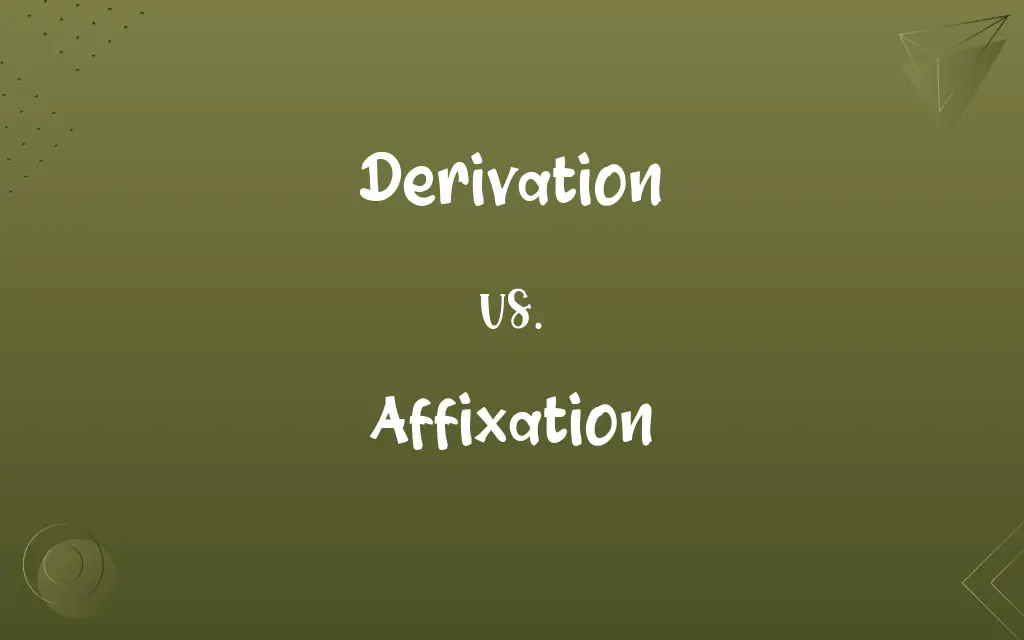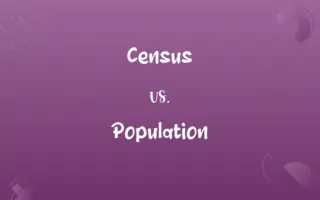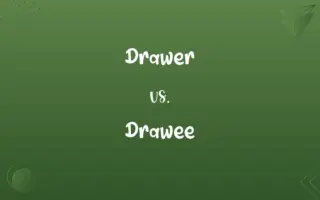Derivation vs. Affixation: Know the Difference
Derivation is the process of creating new words from existing ones by adding affixes, while affixation is the act of adding prefixes, suffixes, or infixes to a word.

Key Differences
Derivation involves creating new words by adding, changing, or removing affixes, thus altering the meaning or grammatical category. Affixation, a part of this process, specifically refers to attaching prefixes, suffixes, or infixes to the base form of a word.
The outcome of derivation is a derived word with a new meaning or grammatical function, whereas affixation is the technical act of adding an affix to a root word, which can be part of derivation.
Derivation can change a word's part of speech, like turning a noun into an adjective. Affixation, in this context, is the method through which this change is achieved by adding relevant affixes.
In derivation, the focus is on the result of the process - a new word with altered meaning. In affixation, the emphasis is on the process itself - the act of adding an affix.
Derivation can involve multiple linguistic processes, including affixation, but affixation strictly refers to the addition of affixes without implying a complete transformation of the word.
ADVERTISEMENT
Comparison Chart
Definition
The process of forming new words from existing ones.
The act of adding an affix to a word.
Focus
On the resulting new word or meaning.
On the method of adding prefixes, suffixes, or infixes.
Impact on Word Class
Can change the grammatical category of a word.
Does not necessarily change word class by itself.
Scope
Broader concept including various word formation processes.
Specific to adding affixes.
Examples
'Happiness' from 'happy', 'reaction' from 'act'.
Adding 'un-' to 'happy', making 'unhappy'.
ADVERTISEMENT
Derivation and Affixation Definitions
Derivation
Word Formation
Derivation transformed 'happy' into 'happiness'.
Affixation
Adding Prefixes
Affixation adds 'un-' to 'known' to form 'unknown'.
Derivation
Changing Word Class
The noun 'beauty' is derived into the adjective 'beautiful'.
Affixation
Modifying Roots
Affixation changes 'do' to 'undo' with a prefix.
Derivation
Grammatical Function Alteration
Derivation turns the verb 'react' into the noun 'reaction'.
ADVERTISEMENT
Affixation
Attaching Suffixes
By affixation, 'care' becomes 'careful' with a suffix.
Derivation
The act or process of deriving.
Affixation
Altering Word Forms
'Happiness' involves affixation of '-ness' to 'happy'.
Derivation
The state or fact of being derived; origination
A custom of recent derivation.
Affixation
Forming New Words
The word 'useful' is created by affixation from 'use'.
Derivation
Something derived; a derivative.
Affixation
(linguistics) The adding of an affix to a word.
Derivation
The form or source from which something is derived; an origin.
Affixation
The result of adding an affix to a root word
Derivation
The historical origin and development of a word; an etymology.
Affixation
Formation of a word by means of an affix
Derivation
The process by which words are formed from existing words or bases by adding affixes, as singer from sing or undo from do, by changing the shape of the word or base, as song from sing, or by adding an affix and changing the pronunciation of the word or base, as electricity from electric.
Affixation
The act of attaching or affixing something
Derivation
In generative linguistics, the generation of a linguistic structure through an ordered or partially ordered series of operations on other structures, such as the creation of a surface structure from a deep structure, or of a complex word from its morphological components.
Derivation
The formal description of the process of such generation.
Derivation
Logic & Mathematics A logical or mathematical process indicating through a sequence of statements that a result such as a theorem or a formula necessarily follows from the initial assumptions.
Derivation
A leading or drawing off of water from a stream or source.
Derivation
The act of receiving anything from a source; the act of procuring an effect from a cause, means, or condition, as profits from capital, conclusions or opinions from evidence.
Derivation
The act of tracing origin or descent.
The derivation of a word from an Indo-European root
Derivation
(grammar) Forming a new word by changing the base of another word or by adding affixes to it.
Derivation
The state or method of being derived; the relation of origin when established or asserted.
Derivation
That from which a thing is derived.
Derivation
That which is derived; a derivative; a deduction.
Derivation
(mathematics) The operation of deducing one function from another according to a fixed definition, referred to as derivation or differentiation; this is the inverse operation to integration.
Derivation
(medicine) A drawing of humors or fluids from one part of the body to another, to relieve or lessen a morbid process.
Derivation
A leading or drawing off of water from a stream or source.
Derivation
The act of receiving anything from a source; the act of procuring an effect from a cause, means, or condition, as profits from capital, conclusions or opinions from evidence.
As touching traditional communication, . . . I do not doubt but many of those truths have had the help of that derivation.
Derivation
The act of tracing origin or descent, as in grammar or genealogy; as, the derivation of a word from an Aryan root.
Derivation
The state or method of being derived; the relation of origin when established or asserted.
Derivation
That from which a thing is derived.
Derivation
That which is derived; a derivative; a deduction.
From the Euphrates into an artificial derivation of that river.
Derivation
The operation of deducing one function from another according to some fixed law, called the law of derivation, as the operation of differentiation or of integration.
Derivation
A drawing of humors or fluids from one part of the body to another, to relieve or lessen a morbid process.
Derivation
The formation of a word from its more original or radical elements; also, a statement of the origin and history of a word.
Derivation
The source from which something derives (i.e. comes or issues);
He prefers shoes of Italian derivation
Derivation
(historical linguistics) an explanation of the historical origins of a word or phrase
Derivation
A line of reasoning that shows how a conclusion follows logically from accepted propositions
Derivation
(descriptive linguistics) the process whereby new words are formed from existing words or bases by affixation: `singer' from `sing'; `undo' from `do'
Derivation
Inherited properties shared with others of your bloodline
Derivation
Drawing of fluid or inflammation away from a diseased part of the body
Derivation
Drawing off water from its main channel as for irrigation
Derivation
Creating New Words
Through derivation, 'act' becomes 'action'.
Derivation
Altering Meaning
Derivation changes 'friend' to 'friendly'.
Repeatedly Asked Queries
How does derivation affect word class?
It can change a word's class, like turning a noun into an adjective.
What does affixation mean?
Affixation refers to adding prefixes, suffixes, or infixes to a word.
Is affixation always part of derivation?
Often, but derivation can also involve other processes.
What is derivation?
Derivation is forming new words from existing ones by modifying them.
Can affixation create new meanings?
Yes, it can alter or refine the meaning of a word.
Can derivation change a word's usage?
Yes, it can alter how and where a word is used.
What are examples of affixation?
Adding 'un-' to 'known' or 'ness' to 'happy'.
What's an example of derivation?
Turning 'react' into 'reaction'.
Is affixation limited to English?
No, it's a common linguistic process in many languages.
Does derivation always involve affixes?
Mostly, but it can also include other word-forming methods.
Does affixation include infixes?
Yes, though they're less common in English.
How does affixation affect grammar?
It can change a word's grammatical role or tense.
What's the difference in focus between derivation and affixation?
Derivation focuses on the new word, affixation on the process.
Are derived words always longer than the original?
Not necessarily; some derived forms can be shorter.
Can affixation alter a word's spelling?
Yes, especially with certain prefixes and suffixes.
Can affixation be reversed?
In some cases, like removing 'un-' from 'undo'.
Are all new words a result of derivation?
Many are, but not all new words come from derivation.
Is affixation a form of word evolution?
In a way, as it contributes to linguistic change over time.
Can affixation change a word's pronunciation?
Yes, it often alters the phonetic structure.
Do all languages use derivation?
Most languages have some form of derivation in word formation.
Share this page
Link for your blog / website
HTML
Link to share via messenger








































































